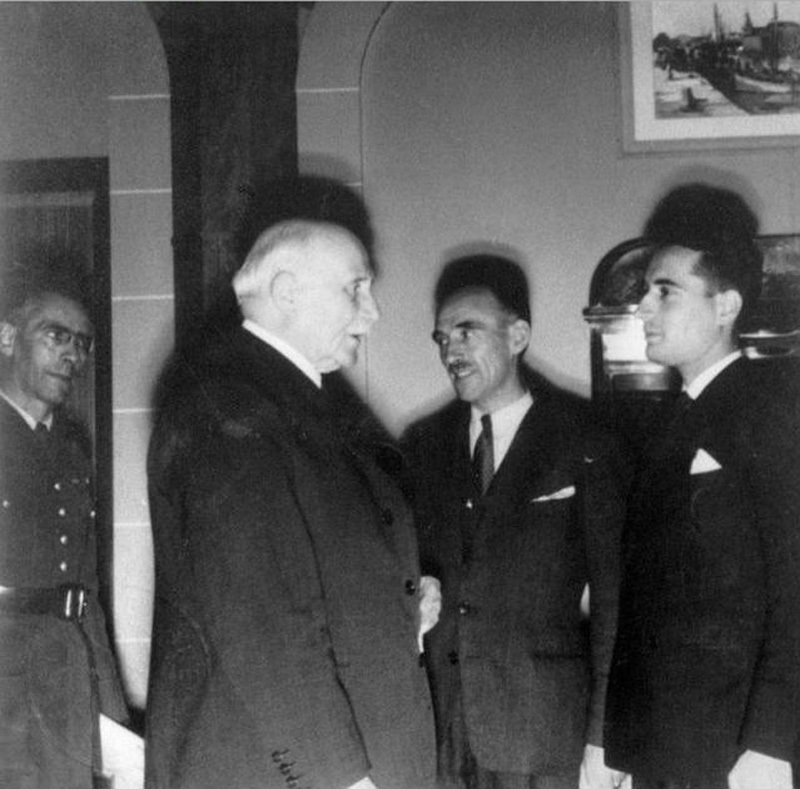 Menu
Menu
 Menu
Menu
History does not change. But our perspectives on it do.
June 5th, 1944 was the beginning of the end of Vichy. That day, BBC broadcast instructions to the Resistance to begin a sabotage campaign. The next morning Allied troops landed on the beaches of Normandy in northern France. A second front opened on August 15th, when Allies— including Charles de Gaulle’s Free French army—landed on France’s Mediterranean shores.

Marshal Pétain with France’s future president François Mitterand (right) in 1942. Like many, Mitterand was a collaborator before joining the Resistance, illustrating the complicated relationship that the French had with Vichy.
The combined efforts of the Allies and the Resistance brought Paris and by extension all of France into the hands of de Gaulle’s Free French on August 25th. The French provisional government in Algiers officially relocated to Paris on September 9th.
To rid itself of Vichy, the provisional government passed an order
that stated the French Third Republic never ceased to exist. The true
and only France had always been de Gaulle’s government-in-exile, that
first took refuge in London then moved to Algiers. All Vichy laws
contrary to the French ideals of liberty, equality, and fraternity were
declared void ab initio, meaning they were never valid.
Meanwhile, a narrative was advanced that collaborators had never been
more than a small minority.
Calls were growing within France to take responsibility for past wrongs.
For fifty years, the official line was that Vichy’s actions were abhorrent, but the Republic held no responsibility for Vichy. This position was repeated by French President François Mitterand as late as 1994. Speaking about the notorious 1942 Vél d’Hiv roundup, when French police rounded up 13,000 Jews and sent them to German death camps, Mitterand said “The Republic had nothing to do with this.”6
Nonetheless, calls were growing within France to take responsibility for past wrongs. A watershed moment came in 1995. In a speech commemorating the Vél d’Hiv roundup, newly-elected president Jacques Chirac said:
France, land of the Enlightenment and of Human Rights, land of hospitality and asylum, France, on that day, committed an irreparable act. It failed to keep its word and delivered those under its protection to their executioners.
He added that “Our debt to [the victims] is inalienable.”7
The weight of these words cannot be understated. This was the first time that a French president acknowledged France’s responsibility for a Vichy crime. As legal scholar Rémi Rouquette has pointed out, Chirac “acknowledged the continuity of the State, even when the most horrible government is in power.”8 Since then, two French presidents have been even more forceful in acknowledging that Vichy crimes were France’s crimes.
France’s highest administrative court ruled that the French Republic was legally responsible.
For all the importance these speeches hold, speeches are not acts of law. It took a court ruling to establish legal responsibility. In 2009, France’s highest administrative court ruled that the French Republic was legally responsible for Vichy’s arrest and deportation of Jews. The ruling satisfied many, including Serge Klarsfeld, France’s leading Holocaust historian. He said “France is showing now that she is at the forefront of countries which are confronting their past, which was not the case even in the 1990s.”9
In France, some controversy still remains over whether or not the French Republic is responsible for the actions of Vichy. The words of three of its past four presidents, along with a ruling by the country’s highest administrative court, say otherwise. The French Republic cannot absolve itself of its Vichy history, and the willingness of its leaders to take responsibility for past mistakes should be admired.
Vichy set out on an authoritarian path, contrary to French ideals of liberty, equality, and fraternity. These ideals never fully died, but it took the weight and work of many brave people—both “great” people and average people—to bring these ideals back to France.
The events that led to Vichy’s creation are complicated. France’s sudden defeat in World War II was traumatic for the nation. Nonetheless, people also are willing to understand that Vichy was not just a Nazi puppet state, created by Nazi collaborators and foisted upon France. Vichy was France’s government, created in France, by France’s legislators with, at that time, broad public support. Public opinion in France did not turn against Vichy until late 1942.
France’s descent into Vichy should serve as a warning for us all. In a perfect storm of circumstance, our rights and freedoms could be swept away in a matter of days. The choices we make about our governments matter, and the support we either give or withhold from our governments matter. Liberal democracy and its embrace of free expression and minority rights should never be taken for granted.
6 quoted in Simons, Marlise. “Chirac Affirms France’s Guilt In Fate of Jews.” The New York Times, 17 July 1995, p. A1.
7 quoted in “Speech of President Jacques Chirac, on July 16, 1995, during the commemoration of the Vel d’Hiv roundup.” www.levendel.com/En/html/chirac-s_speech.html
8 Rouquette, Rémi. “The French Administrative Court’s Rulings on Compensation Claims Brought by Jewish Survivors of World War II.” Maryland Journal of International Law, Vol. 25, No. 1, 2010, p. 307.
9 quoted in Davies, Lizzy. “France faces its guilt for deporting Jews in war.” Brisbane Times, 18 February 2009.